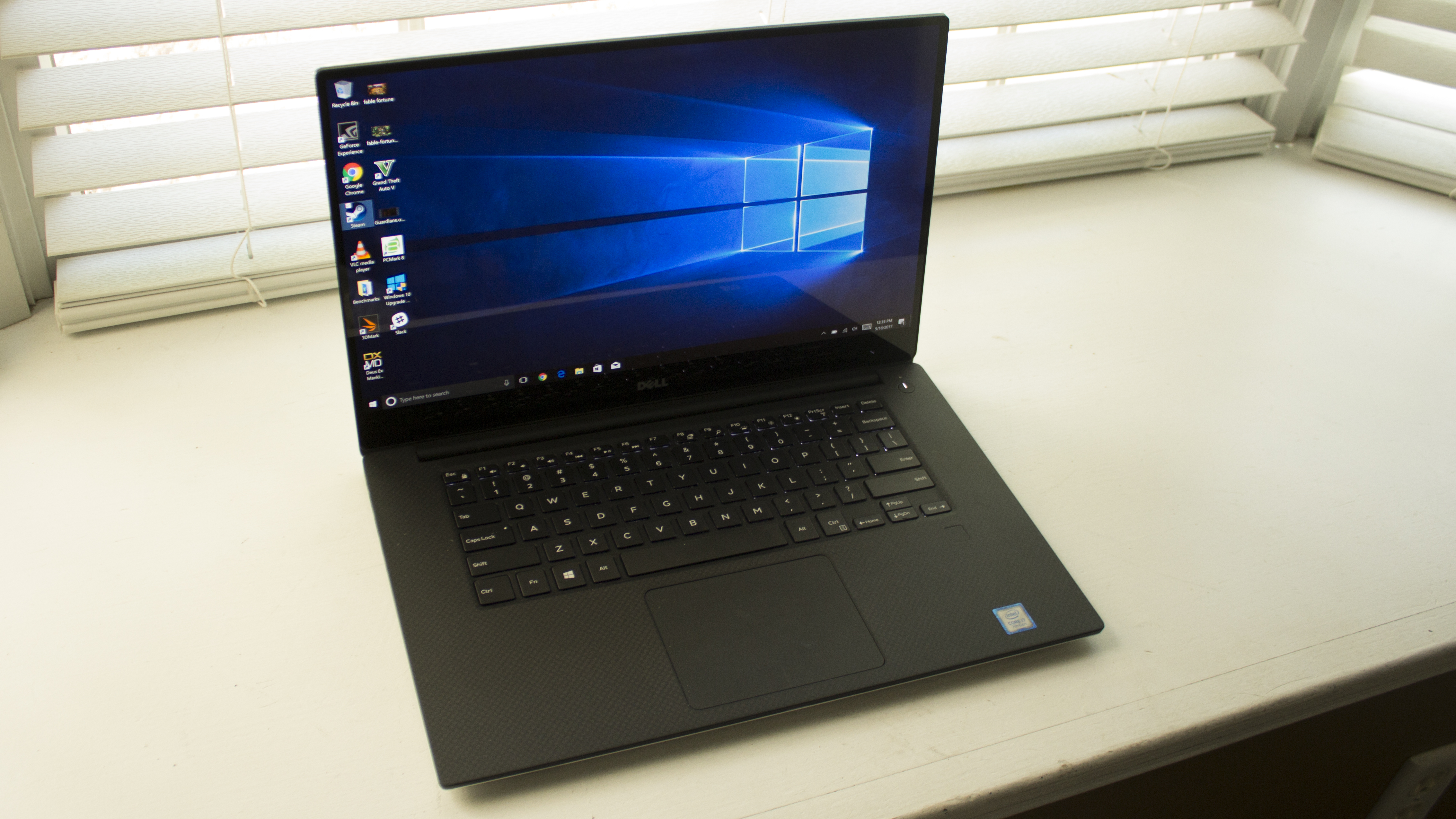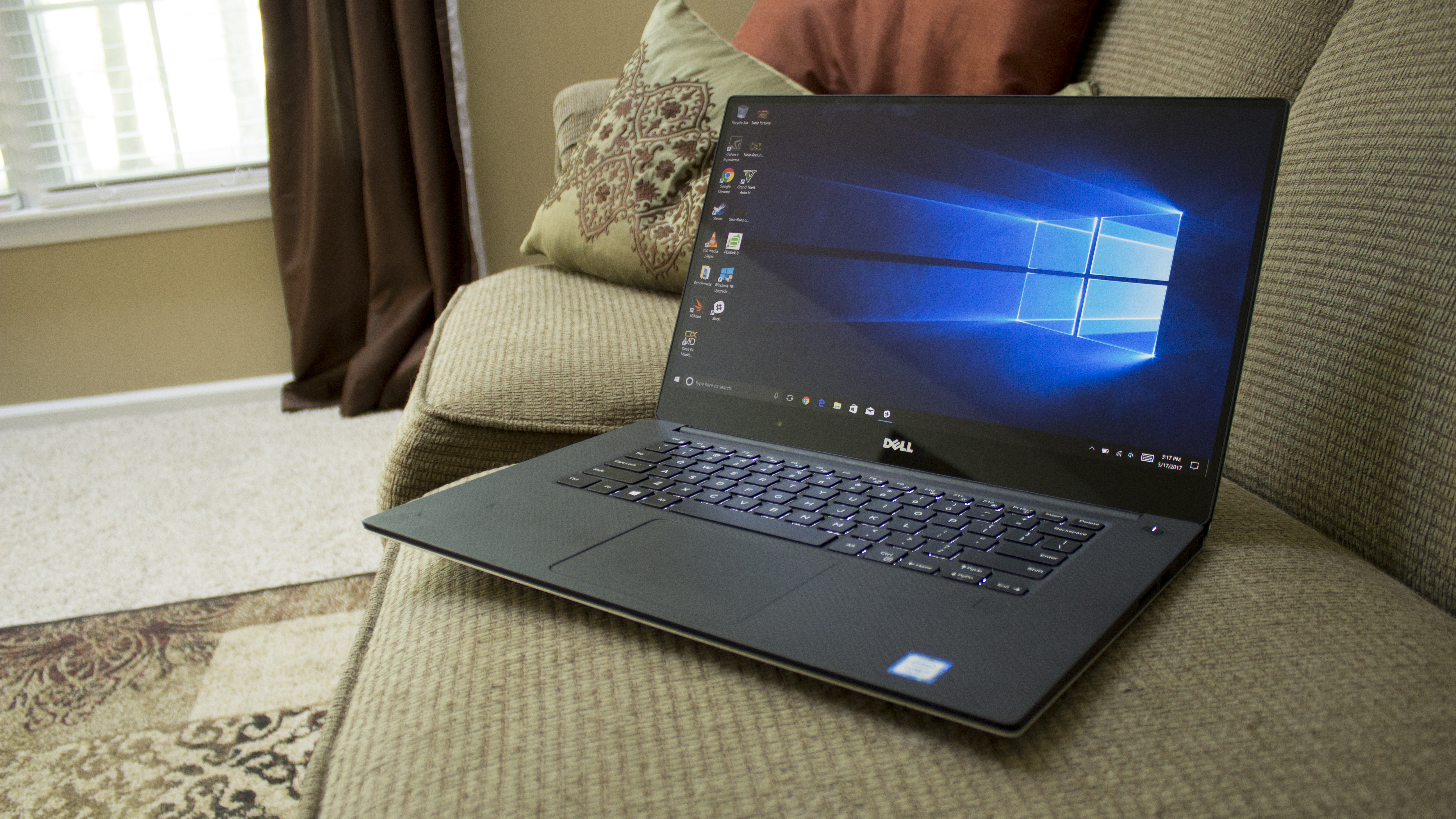TechRadar Verdict
While no laptop can be proficient in every area, the Dell XPS 15 makes a valiant effort to accomplish just that. With the exception of playing games, Dell has proven once again that it can build a laptop that appeals to (almost) everyone.
Pros
- +
Gorgeous 4K display
- +
Blazing fast CPU
- +
Much improved battery
- +
Legacy ports still at play
Cons
- -
Middling graphics
- -
Poor webcam placement
- -
Bloatware
Why you can trust TechRadar
Next to the Dell XPS 13, the 15-inch version of Dell’s best-in-class laptop has a lot to live up to. And, although it doesn’t quite match the score of its 13-inch sibling, the Dell XPS 15 is worth your consideration. After all, it’s coming from the biggest laptop supplier to businesses in the US.
Following the unfortunate battery life shortage found on the previous iteration of the Dell XPS 15, we admit that our expectations were low regarding the new model. The unflattering native sound quality and underwhelming inclusion of Nvidia GeForce GTX 960M graphics didn’t do it any favors either.
Luckily, many of the problems we experienced in last year’s model have been mitigated in the 2017 Dell XPS 15. Better yet, all of the aspects we liked about it before are still present, and there are also a wide range of configurations to choose from, making the latest XPS 15 a worthy addition to our best laptops rankings.
Here is the Dell XPS 15 configuration sent to TechRadar for review:
CPU: 2.8GHz Intel Core i7-7700HQ (quad-core, 6MB cache, up to 3.8GHz)
Graphics: Nvidia GeForce GTX 1050 (4GB GDDR5); Intel HD Graphics 630
RAM: 16GB DDR4 (2,400MHz)
Screen: 15.6-inch, UHD (3,840 x 2,160) InfinityEdge touch display
Storage: 512GB SSD (PCIe)
Ports: 2 x USB 3.0, 1 x USB-C (Thunderbolt 3) w/ PowerShare, 1 x HDMI 1.4, SD card reader, headset jack
Connectivity: Killer 1535 802.11ac 2x2 WiFi; Bluetooth 4.1
Camera: 720p widescreen HD webcam with dual array digital microphones
Weight: 4 pounds (1.8kg)
Size: 14.06 x 9.27 x 0.45 – 0.66 inches (357 x 235 x 11 – 17mm; W x D x H)
Price and availability
Why you can trust TechRadar
As we said, there are a ton of hardware options to choose from when it comes to the Dell XPS 15. For that reason, you could end up with a completely different laptop than someone who decides to spend more or less on their purchase.
While the model we were sent for review is valued at $2,174 (£1,814, AU$2,634), it comes with a luxury, 7th-generation Intel Core i7-7700HQ quad-core processor, 16GB of RAM, 512GB of SSD storage, a 4K InfinityEdge touch display, an Nvidia GeForce GTX 1050 graphics card and a built-in fingerprint reader for Windows Hello logins.
Assuming your tastes don’t require all of these bells and whistles, what you get with the entry level Dell XPS 15 depends on where you live. In the US, it’s $999 for an Intel Core i3 processor, 8GB of RAM, a 1080p non-touch display and a 500GB hard drive paired with 32GB of SSD storage for the OS – no discrete graphics or fingerprint reader in sight.
In the UK, the Dell XPS 15 starts at £1,429 for an i5 processor, 8GB of RAM, a full HD screen (once again, no touch) and a 1TB hard drive/128GB SSD combo.
Meanwhile, in Australia, you’ll have to shell out a whopping AU$2,209 for the ‘cheapest’ Dell XPS 15. The silver lining is that, in addition to sporting a 7th-gen Core i7 CPU, 8GB of RAM and a 256GB SSD, this model also houses a GTX 1050 and a fingerprint reader.

Design
At first glance, the 2017 Dell XPS 15 doesn’t look much different than its predecessor. It still has a silvery aluminum shell that closes in on a rubberized material surrounding plastic inputs. Only the keyboard has been refined since the last time we saw it.
Though the key travel is relatively low, the Dell XPS 15 boasts a keyboard that’s both spacious and comfy, keeping in line with trends followed by the likes of the HP Spectre x360 15 and even Apple’s 15-inch MacBook Pro. The touchpad remains clicky, which is great for those who want that, though this reviewer in particular prefers the silent clicks exhibited by the Force Touch trackpad on the MacBook.
Still, the inputs on the Dell XPS 15 compare nicely to those of the competing Gigabyte Aero 15 whose keys are so tightly packed that it’s a nuisance trying to get anything done outside of gaming. At the very least, the tracking and left/right click detection is par for the course on the Dell XPS 15.

Ultra-high pixel density
For $400 (£210, AU$35) on top of the initial cost of the 1080p versions, you can get a lush, 4K (3,840 x 2,160) screen that puts the 2,880 x 1,800 resolution Retina Display found in the MacBook Pro 15-inch to shame. Granted, there’s no Touch Bar on the Dell XPS 15, but you can always opt for a pricier version of the notebook that features the elusive fingerprint scanner and a full-on touchscreen.
To put a finer point on it, the 4K Dell XPS 15 bears a pixel density of 282.4 pixels per inch (ppi), while the 15.4-inch display on the MacBook Pro stands at 220.5 ppi. It may not seem like a steep difference, but considering the MacBook Pro costs more for arguably inferior parts, there’s clearly a value disparity between the two devices.
Although it’s kind of a gratuitous cosmetic feature, there’s no denying that Dell’s InfinityEdge technology adds gusto to the Dell XPS 15’s look. However, the narrow bezels once again force the webcam to the lower left-hand corner of the upright panel. Seriously consider whether you want to literally look down at your audience while broadcasting and Skyping if you proceed to buy this laptop.

